
The Union of Soviet Socialist Republics (USSR), commonly known as the Soviet Union, was a transcontinental country that spanned much of Eurasia from 1922 to 1991. During its existence, it was the largest country by area, extending across eleven time zones and sharing borders with twelve countries, and the third-most populous country. An overall successor to the Russian Empire, it was nominally organized as a federal union of national republics, the largest and most populous of which was the Russian SFSR. In practice, its government and economy were highly centralized. As a one-party state governed by the Communist Party of the Soviet Union, it was a flagship communist state. Its capital and largest city was Moscow.
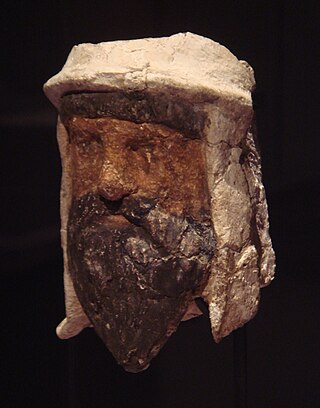
Tajikistan harkens to the Samanid Empire (819–999). The Tajik people came under Russian rule in the 1860s. The Basmachi revolt broke out in the wake of the Russian Revolution of 1917 and was quelled in the early 1920s during the Russian Civil War. In 1924, Tajikistan became an Autonomous Soviet Socialist Republic of the Soviet Union, the Tajik ASSR, within Uzbekistan. In 1929, Tajikistan was made one of the component republics of the Soviet Union – Tajik Soviet Socialist Republic – and it kept that status until gaining independence 1991 after the dissolution of the Soviet Union.
The politics of Tajikistan nominally takes place in a framework of a presidential republic, whereby the President is both head of state and head of government, and of a multi-party system. Legislative power is vested in both the executive branch and the two chambers of parliament.

Uzbekistan is a landlocked country in Central Asia. It is itself surrounded by five landlocked countries: Kazakhstan to the north; Kyrgyzstan to the northeast; Tajikistan to the southeast; Afghanistan to the south, Turkmenistan to the south-west. Its capital and largest city is Tashkent. Uzbekistan is part of the Turkic languages world, as well as a member of the Organization of Turkic States. While the Uzbek language is the majority spoken language in Uzbekistan, Russian is widely used as an inter-ethnic tongue and in government. Islam is the majority religion in Uzbekistan, most Uzbeks being non-denominational Muslims. In ancient times it largely overlapped with the region known as Sogdia, and also with Bactria.

The Singing Revolution was a series of events from 1987 to 1991 that led to the restoration of independence of the three Soviet-occupied Baltic countries of Estonia, Latvia, and Lithuania at the end of the Cold War. The term was coined by an Estonian activist and artist, Heinz Valk, in an article published a week after the 10–11 June 1988 spontaneous mass evening singing demonstrations at the Tallinn Song Festival Grounds.

The Moldavian Soviet Socialist Republic or Moldavian SSR, also known as the Moldovan Soviet Socialist Republic, Moldovan SSR, Soviet Moldavia, Soviet Moldova, or simply Moldavia or Moldova, was one of the 15 republics of the Soviet Union which existed from 1940 to 1991. The republic was formed on 2 August 1940 from parts of Bessarabia, a region annexed from Romania on 28 June of that year, and parts of the Moldavian Autonomous Soviet Socialist Republic, an autonomous Soviet republic within the Ukrainian SSR.

An index of articles related to the former nation known as the Soviet Union. It covers the Soviet revolutionary period until the dissolution of the Soviet Union. This list includes topics, events, persons and other items of national significance within the Soviet Union. It does not include places within the Soviet Union, unless the place is associated with an event of national significance. This index also does not contain items related to Soviet Military History.
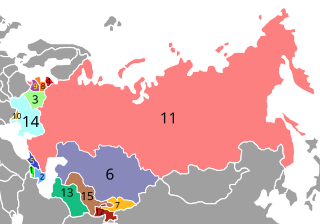
The post-Soviet states, also referred to as the former Soviet Union (FSU) or the former Soviet republics, are the independent sovereign states that emerged/re-emerged from the dissolution of the Soviet Union in 1991. Prior to their independence, they existed as Union Republics, which were the top-level constituents of the Soviet Union. There are 15 post-Soviet states in total: Armenia, Azerbaijan, Belarus, Estonia, Georgia, Kazakhstan, Kyrgyzstan, Latvia, Lithuania, Moldova, Russia, Tajikistan, Turkmenistan, Ukraine, and Uzbekistan. Each of these countries succeeded their respective Union Republics: the Armenian SSR, the Azerbaijan SSR, the Byelorussian SSR, the Estonian SSR, the Georgian SSR, the Kazakh SSR, the Kirghiz SSR, the Latvian SSR, the Lithuanian SSR, the Moldavian SSR, the Russian SFSR, the Tajik SSR, the Turkmen SSR, the Ukrainian SSR, and the Uzbek SSR. In Russia, the term "near abroad" is sometimes used to refer to the post-Soviet states other than Russia.

The People's Movement of Ukraine is a Ukrainian political party and the first opposition party in Soviet Ukraine. It is often simply referred to as the Movement. The party under the name Rukh was an observer member of the European People's Party (EPP) until 2013. It is considered to have played a key role in Ukraine regaining its independence in 1991.

The Belarusian Popular Front "Revival" was a social and political movement in Belarus in the late 1980s and 1990s whose goals were national revival of Belarus, its democratization and independence from the Soviet Union. Its leader was Zianon Pazniak. It was similar to the Popular Fronts of Latvia and Estonia, and the Sąjūdis movement in Lithuania.
Alikbek Jekshenkulov is the former Foreign Minister of Kyrgyzstan (2005–2007) and now the leader of the oppositional party "Za spravedlivost".

Democratic Union was the first official political opposition party in the Soviet Union. It was founded on 8 May 1988 by a group of Soviet dissidents including Valeriya Novodvorskaya, Sergei Grigoryants and Yevgeniya Debryanskaya.

The Popular Front of Moldova was a political movement in the Moldavian SSR, one of the 15 union republics of the former Soviet Union, and in the newly independent Republic of Moldova. Formally, the Front existed from 1989 to 1992. It was the successor to the Democratic Movement of Moldova, and was succeeded by the Christian Democratic Popular Front and ultimately by the Christian-Democratic People's Party.
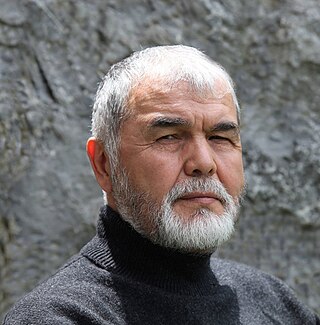
Muhammad Salih is an Uzbek political opposition leader and writer. He was the opposition candidate in the 1991 Uzbek presidential election, the first and only time an Uzbek president has faced a serious challenger in an election.
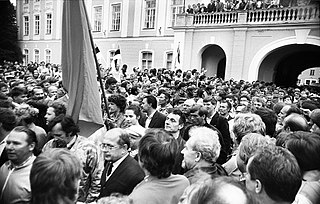
The Intermovement(International Movement of Workers in the Estonian Soviet Socialist Republic) was a political movement and organisation in the Estonian SSR. It was founded on 19 July 1988 and claimed by different sources 16,000 - 100,000 members. The original name of the movement was Interfront, which was changed to Intermovement in autumn 1988.
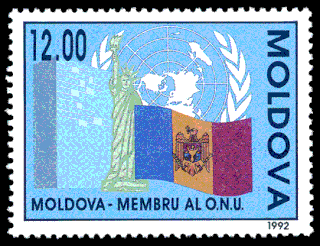
The following is timeline of the History of independent Moldova which started after the independence of Moldova.

Polish autonomy in the Vilnius Region was an idea about a politically autonomous territorial unit for Poles in Lithuania, which began to be discussed in autumn 1988, when Lithuania was regaining its independence from the Soviet Union. As a result of perestroika, under the influence of their own national revival, and also fearing an attempt at Lithuanianization in independent Lithuania, Poles in Lithuania attempted to protect their own cultural identity by establishing autonomy. According to the Polish sociologist Adam Bobryk, this project never gained full support from the Lithuanian authorities, nor was implemented unilaterally by the Poles. The project was subject to several years of discussion and design work in 1988–1991, various groups of the Polish minority differed about its ultimate shape, basically agreeing only that autonomy should cover areas where Poles are the majority, and the Polish language should be given equal status.

The Union of Soviet Socialist Republics (USSR) was formally dissolved as a sovereign state and subject of international law on 26 December 1991 by Declaration № 142-Н of the Soviet of the Republics of the Supreme Soviet of the Soviet Union. It also brought an end to the Soviet Union's federal government and General Secretary Mikhail Gorbachev's effort to reform the Soviet political and economic system in an attempt to stop a period of political stalemate and economic backslide. The Soviet Union had experienced internal stagnation and ethnic separatism. Although highly centralized until its final years, the country was made up of 15 top-level republics that served as the homelands for different ethnicities. Annexation of at least 3 of them by Soviet Union during the World War II was never fully recognized. By late 1991, amid a catastrophic political crisis, with several republics already departing the Union and Gorbachev continuing the waning of centralized power, the leaders of three of its founding members, the Russian, Belorussian, and Ukrainian SSRs, declared that the Soviet Union no longer existed. Eight more republics joined their declaration shortly thereafter. Gorbachev resigned on 25 December 1991 and what was left of the Soviet parliament voted to dissolve the union.

Birdamlik, officially Birdamlik People's Democratic Party, is a political organization based in Uzbekistan. It has promoted economic liberalism and nonviolent resistance through populist rhetoric.

The Communist Party of Uzbekistan is a banned communist party in Uzbekistan, founded in 1994. The party considers itself the only and true successor of the Communist Party of the Uzbek SSR, although on November 1, 1991, the former Communist Party of the Uzbek SSR was transformed into the People's Democratic Party of Uzbekistan (XDP). Immediately after its creation, the party's activists tried to officially register the party in Uzbekistan, but in response, the registration of the Communist Party of Uzbekistan was rejected and the party was actually banned throughout Uzbekistan and outlawed. Many activists and party members were persecuted by the Uzbek authorities, and many were forced to flee the country, mainly to Russia. The founder and permanent leader of the party is Kakhraman Makhmudov


















